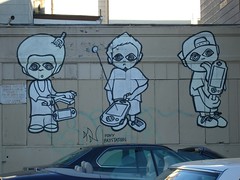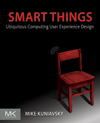For the new year, I was treated to an amusing honor. Australian ABC news used one of my Flickr pictures to illustrate a story on Sony's fake graffiti ad campaign. This kind of "guerilla" advertising always smells of someone in an ad agency reading a business book, then pitching the idea to an ad buyer who doesn't really know what hip is, but works for a hip company. This kind of astroturfing nearly always backfires. Like Nike's appropriation of a Minor Threat record cover last year, it may sound like a good idea to everyone except its audience. When a phenomenon was mocked by the Simpsons 8 years ago, it's probably time to give it a rest. That said, maybe Sony managed to get some of the 18-24 year-olds who were the likely target of this campaign to actually buy a PSP, but--frankly--I don't see how. I think they would have done much better if they let real graffiti writers design custom cases for the things, or something.
On another graffiti-meets-video games note, it seems that after two years, Getting Up, the graffiti-themed video game cobranded with Marc Ecko's clothing line is nearly complete. I hope they've fixed some of the moralist-baiting stuff: versions I saw had the lead character doing all kinds of violence against hapless security guards in order to get into a good spot for tagging. That's both unlike how graffiti writers generally behave and totally undermines any positive "graffiti is cool" message Ecko and Atari may have. It's using cultural cues with no appreciation of the long-term effects on that culture (contrast with GTA: San Andreas, which was a full-on homage to the culture it was invoking, down to the stuff revealed by the"Hot Coffee" mod). But, then again, that's not surprising, either. Clueless cultural tourism is par for the course for unsuccessful products. It's one of the things that makes them unsuccessful. Good luck Sony and good luck Atari.
Finally, I think that the reason my picture was picked was because of its Creative Commons license. Woohoo! Go CC.





No problem. Thank you for clearing up the ABC noncommercial thing. I didn't realize that ABC was a public broadcaster. And, fwiw, PBS in the US is on a different model: they are not government funded per se, they get their money from licensing their content to local affiliates, and from distributing content created by local affiliates. These local affiliates get their money by asking the public and corporations to donate it. If it's anything like NPR, national public radio, it gets less than 10% of its funding from the government.
Hi Mike,
Thanks for the use of your photo. I was going to email you to let you know about us using it but it then slipped my mind. Sorry about that.
Just to let you know, as Nick says, the ABC is a government-funded public broadcaster. We don't show any ads and are not a commercial or for-profit organisation.
For that reason, I thought we would fit under the 'non-commercial' terms of the licence. Apologies if we stretched the licence too far.
And yes, the CC licence was definitely part of the reason I used your photo. The traditional picture agencies we use didn't have any photos of the PSP ads, so Flickr and CC was a handy alternative.
Thanks again.
i followed links to here starting from the ABC website so that can only be a good thing for the CC license.
however one thing that should be noted is that the australian ABC network is a taxpayer funded, non-commercial broadcasting network (radio, tv and internet - similar to the BBC and kind of like a PBS in a more perfect world) and they're pretty strict about mentioning _any_ products on air (ie. you won't see product placement on their locally produced shows which, sadly, are becoming rarer due to budget cuts from an australian gov't that is also pushing for advertising on the same ABC).
sorry - a bit of a rant here but i guess it's just my interpretation of 'noncommercial use' extends to 'not-for-profit' organisations. that and our gov't sucks.
Heh. Thanks. No, they didn't pay me and I'm going to let it slide, even though my license says it's for "Noncommercial use." That doesn't mean I'll do it every time, but I think it's OK since they respected the rest of the CC license and I want to encourage its use.
Finally, a commentary on the whole PSP campaign that sheds more light than heat!
"Clueless cultural tourism is par for the course for unsuccessful products. It's one of the things that makes them unsuccessful."
Oh, SNAP! ;-)
So, did ABC pay you for your photo? Just curious.